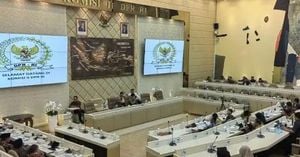Italy marked the 81st anniversary of the Ardeatine Caves massacre on March 24, 2025, commemorating the tragic execution of 335 Italians by Nazi officers during World War II. This massacre occurred in retaliation for a Partisan attack that claimed the lives of 33 German soldiers in central Rome. In an act of brutal vengeance, the Nazis executed ten Italians, including civilians, political prisoners, and Jews, for every German soldier killed, encapsulating a grim chapter in the history of the Nazi occupation.
President Sergio Mattarella led the remembrance by laying a wreath at the memorial located at the site of the massacre. He was joined by Defence Minister Guido Crosetto, Lazio Governor Francesco Rocca, Rome Mayor Roberto Gualtieri, Chief Rabbi Riccardo Di Segni, and Noemi Di Segni, president of the Union of Italian Jewish Communities, emphasizing the unified remembrance of this dark day. During the ceremony, the names of the victims were read aloud, reaffirming their place in the collective memory of the nation.
Premier Giorgia Meloni reflected on the massacre, describing it as, "one of the most piercing wounds inflicted to Rome and to all of Italy.” In a statement from her office, she reiterated the importance of commemorating such painful histories to ensure they are not forgotten, especially by the younger generations. Meloni stated, "On this day, we pay homage to the 335 victims of the indescribable massacre and we renew the commitment to preserve and protect the values of freedom and democracy on which our Republic is founded.”
This sentiment was echoed by Noemi Di Segni, the President of the Union of Italian Jewish Communities, who stressed the necessity of remembrance in understanding the past. She remarked, "The presence of students here is important so they can understand exactly what a massacre means and what a Nazi slaughter is,” emphasizing the ongoing relevance of historical consciousness in relation to current events. Di Segni cautioned against the misuse of such terms in today's contexts, highlighting the critical need for clarity when discussing historical atrocities.
Rome's Mayor Roberto Gualtieri characterized the massacre as an, "enduring wound" for the city, remarking, "Remembering is a duty. Because only through memory can we remain united as a community and progress based on the values on which constitutional democracy was born: anti-Fascism, resistance, the rejection of those crimes.” Gualtieri’s remarks resonated deeply with the essence of the ceremony, reinforcing collective commitment to the principles that underpin societal unity and progress.
The commemoration comes amidst other significant events in Italy, including a fire at a juvenile detention center in Milan and investigations into medical malpractice involving three doctors. Early reports suggest that the fire was caused by burning mattresses on the second floor of the Beccaria prison, affecting five individuals, including two inmates and staff members. Fortunately, nobody suffered serious injuries.
In another case, a man was tragically shot and killed in Anzio, near Rome, illustrating ongoing social challenges. Investigations are currently underway, as authorities delve into the victim's background, noted to have a history of drug-related criminal activity.
As Italy remembers its dark past, the reflection on social issues continues with the ongoing investigation into the death of Simonetta Kalfus, a woman who died following liposuction surgery earlier this month. Three doctors are now facing accusations of involuntary manslaughter as the autopsy revealed that sepsis was the cause of her death.
On a lighter note, over the weekend, more than 400,000 people participated in the 33rd FAI Spring Days across Italy, celebrating cultural heritage despite inclement weather. This event marked the 50th anniversary of the Italian Environmental Fund and opened numerous cultural sites to the public, fostering a sense of community and appreciation for Italy's rich history.
March 24 also coincided with the European Artisanal Gelato Day, with the release of a special flavor, "Hallelujah," created in honor of the Jubilee, combining toasted hazelnuts and pure chocolate. This culinary celebration marks Italy’s contribution to global gastronomy and reflects the nation’s ongoing cultural dynamism.
Thus, the day of remembrance for the Ardeatine Caves massacre is not isolated but coexists with contemporary issues and celebrations that remind Italians of their history while inspiring hope for future progress amidst trials.
Overall, the memorial services highlighted the resilience of the Italian spirit, commemorating lost lives while also engaging with ongoing social narratives. As Italy continues to confront its past, it resonates with the guiding principles that define both its history and its future. The commitment to preserve democracy's values and to honor the memory of the victims strengthens solidarity in facing the challenges of today.





